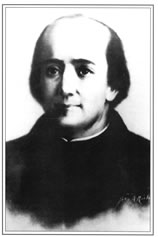Here
we are at Maskoutens This word may, in Algonquin, mean "the
Fire Nation," which, indeed, is the name given to this tribe.
Here is the limit of the discoveries which the French have made,
for they have not yet gone any farther.
This village consists of three nations who have gathered thereMiamis,
Maskoutens, and Kikabous. The former are the most civil, the
most liberal, and the most shapely. They wear two long locks
over their
ears, which give them a pleasing appearance. They are regarded
as warriors, and rarely undertake expeditions without being successful.
They are very docile, and listen quietly to what is said to them;
and they appeared so eager to hear Father Alloues when he instructed
them that they gave him but little rest, even during the night.
The
Maskoutens and Kikabous are ruder, and seem peasants in comparison
with the others. As bark for making cabins is scarce in this
country, they use rushes; these serve them for making walls
and roofs, but
do not afford them much protection against the winds, and still
less against the rains when they fall abundantly. The advantage
of cabins
of this kind is that they make packages of them and easily transport
them wherever they wish, while they are hunting.
When I visited them, I was greatly consoled at seeing a handsome
cross erected in the middle of the village and adorned with
many white skins, red belts, and bows and arrows, which these
good
people had offered to the Great Manitou (this is the name which
they give
to God). They did this to thank I Him for having had pity on
them during the winter, by giving them an abundance of game
when they
most dreaded famine.
1 took pleasure in observing the situation of this village.
It is beautiful and very, pleasing; for, from an eminence
upon which
it
is placed, one beholds on every side prairies, extending
farther than the eye can see, interspersed with groves or with
lofty
trees. The soil is very fertile, and yields much Indian corn.
The Indians
gather quantities of plums and grapes, wherewith much wine
could be made, if desired.
No sooner had we arrived than we, Monsieur Jollyet and I,
assembled the elders together; and he told them that he
was sent by Monsieur
Our Governor to discover new countries, while 1 was sent
by God it) illumine them with the light of the Holy Gospel.
He
told
them that,
moreover, the Sovereign Master of our lives wished to be
known by all the nations; and that in obeying Ills will
I feared not the death to which I exposed myself in voyages so
perilous.
Ile
informed
them that we needed two guides to show LIS the way; and
we gave them a
present, by it asking them to grant us the guides. To this
they very, civilly consented; and they also spoke to us
by means of
a present,
consisting of a mat to serve us as a bed during the whole
of our voyage.
On the following day, the tenth of June, two Miamis who
were given as guides embarked with its, in the sight
of a great
crowd, who
could not sufficiently express their astonishment at
the sight of seven
Frenchmen, alone and in two canoes, daring to undertake
so extraordinary, and so hazardous an expedition.
We knew that, at three leagues from Maskoutens, was a
river which discharged into Missisipi. We knew also
that the
direction we
were to follow in order to reach it was west southwesterly.
But the
road is broken by so many swamps and small lakes that
it is easy to lose
one's way, especially as the river leading thither
is so full of wild oats that is difficult to find the channel.
For this
reason
we greatly needed our two guides, who safely conducted
us to a portage of 2,700 paces, and helped us to transport
our
canoes
to
enter that
river; after which they returned home, leaving us alone
in this unknown country, in the hands of Providence.
Thus we left the waters flowing to Quebeq, 4 or 500
leagues from here, to float on those that would thenceforward
take us through
strange lands. Before embarking thereon, we began
all together a new devotion to the Blessed Virgin Immaculate,
which
we practiced daily, addressing to her special prayers
to place
under her
protection both our persons and the success of our
voyage;
and, after mutually
encouraging one another, we entered our canoes.
His river on which we embarked is called Meskousing.
It is very wide; it has a sandy bottom, which forms
various shoals
that
render its
navigation very difficult. It is fill[ of islands
covered with vines. On the banks one sees fertile
land, diversified
with
woods, prairies,
and hills. There are oak, walnut, and basswood
trees; and
another kind, whose branches are armed with long
thorns. We saw there
neither feathered game nor fish, but many deer
and a large number of cattle.
Our route lay to the southwest, and, after navigating
about 30 leagues, we saw a spot presenting all
the appearances of an iron
mine; and,
in fact, one of our party who had formerly seen
such mines,
assures us that the one which we found is very
good and very rich. It
is covered with three feet of good soil, and is
quite near a chain
of rocks, the base of which is covered by very
fine trees. After proceeding
40 leagues on this same route, we arrived at the
mouth of our river; and, at 42 and a half degrees of latititude,
we safely entered
Mississipi
on the
17th of June,
with a joy that I cannot express.
|


